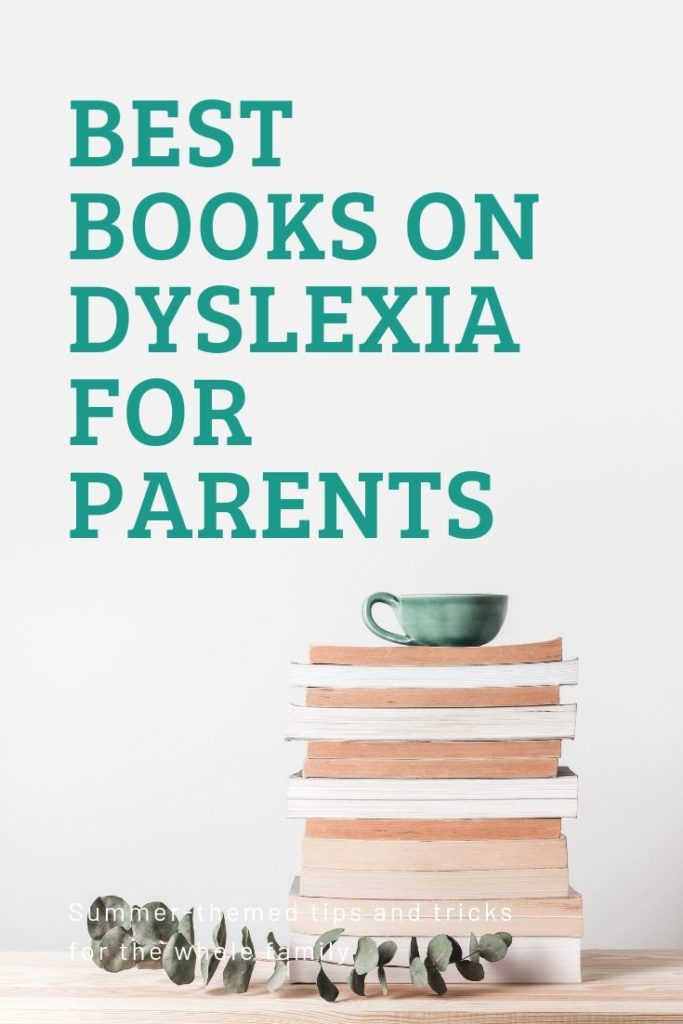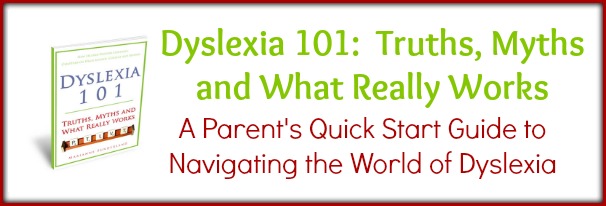One thing I’ve learned after 20 years of homeschooling a houseful of smart and creative kids with dyslexia is that I am never done learning. I especially love to learn from people who have gone before me who have practical experience successfully teaching kids.
I love to learn about learning and apply what I’m learning with my kids at home. Learning about different educational methods and philosophies has become a bit of a hobby for me.
Here are my top picks for most inspiring books that every parent should read on teaching kids with (or without) dyslexia (links to Amazon are affiliate links):

Books on Dyslexia
There are some classics that all parents of kids with dyslexia should read.
Overcoming Dyslexia, by Sally Shaywitz: The landmark book chronicling the research done at Yale University on dyslexia that shows dyslexia is a different wiring in the brain. Too many people misunderstand dyslexia and this is one of the best books on getting the facts about dyslexia – founded on research.
Right-Brain Children in a Left-Brain World, by Jeffery Freed and Laurie Parsons: I love this book because the authors have walked the road – teaching many kids with dyslexia. One day I would like to write its sister book “Left-Brain Parents in a Right-Brain Family”!
The Dyslexic Advantage, by Brock Eide and Fernette Eide: Researchers Brock and Fernette Eide look at dyslexia from a strengths standpoint – an angle that more and more people who understand dyslexia are looking to promote. This books lays out in great detail the inherent strengths of the dyslexic mind.
Dyslexia 101, Marianne Sunderland: This is the book I wrote as a quick-start guide for parents (or family members) to understand what dyslexia is and perhaps more importantly, what it is not.
Books on Educational Methods
Except for the one year that we bought a boxed curriculum and had the worst year of homeschooling ever, we are eclectic homeschoolers. That means that we choose from different methods and curricula every year depending on what works best for our family. The following books are about methods that we have found the most success with in our homeschool.
Montessori
The Montessori Method of education, developed by Dr. Maria Montessori, is a child-centered educational approach based on scientific observations of children from birth to adulthood. Dr. Montessori’s Method has been time tested, with over 100 years of success in cultures throughout the world. The Montessori method includes multiage groupings (sounds like homeschooling) that foster peer learning, uninterrupted blocks of work time, and guided choice of work activity. Geared more for the early learning/preschool crowd.
Teach Me to Do It Myself: Montessori Activities for You and Your Child by Maja Pitamic: This is a great practical guide to implementing the Montessori method in your home with tons of activities that Maria Montessori included in her own schools.
How to Raise and Amazing Child the Montessori Way by Tim Seldin: How to create a Montessori life style at home – covering many of the frequently asked questions about this popular teaching style.
Charlotte Mason
The Charlotte Mason method promotes educating the whole child and in that vein includes and values studies of nature, art, music, and good literature. It is a balance that really works with my intelligent, non-print learners. It works with all kinds of learners but the gentle discovery method of learning works especially well with kids who like to move and experience the world and who may get bored with the traditional textbook approach.
A Charlotte Mason Companion: Personal Reflections on the Gentle Art of Learning by Karen Andreola. I have read and re-read this book over the past 15 years since I first discovered it. Karen Andreola discovered and used the Charlotte Mason method for years before writing this book explaining the method and how to implement in the homeschool.
The Original Homeschooling Series by Charlotte Mason (on Kindle) To be honest, I have never read this entire 6-book series. I bought it for $1.99 on Kindle and read it from time to time. Karen Andrea’s book put’s Mason’s writing in the perspective and language that I can understand but I thought some of you might enjoy the series and for $1.99, I thought it worth listing.
Classical Education
We dove into this approach to education for 5 years. Our one non-dyslexic child still participates in a Classical co-op. We loved the community cultivated by Classical Conversations. There is a structure with freedom that worked really well with my family. Read this post for more information on our experience with Classical Conversations and Dyslexia. We will be back next year for another year of this fantastic program that teaches kids to think the way that their brains are developed to learn.
The Core : Teaching Your Child the Foundations of Classical Education by Leigh Bortins: In this book, Bortins gives parents an overview of the Classical Method and the tools and methodology to implement a rigorous, thorough, and broad curriculum based on the classical model.
Simply Classical: A Beautiful Education for Any Child, by Cheryl Swope: This book guides parents and teachers in implementing the beauty of a classical education with special-needs and struggling students. The love of history, music, literature, and Latin instilled in her own children has created in Cheryl the desire to share the message that classical education offers benefits to any child.
Read this post for more information on choosing homeschool curriculum for kids with dyslexia.
Miscellaneous Books on Learning
Normal Sucks by Jonathan Mooney: This is an incredible read. As a neuro-diverse kid diagnosed with dyslexia and ADHD who didn’t learn to read until he was twelve, the realization that he wasn’t the problem―the system and the concept of normal were―saved Mooney’s life and fundamentally changed his outlook. Here he explores the toll that being not normal takes on kids and adults when they’re trapped in environments that label them, shame them, and tell them, even in subtle ways, that they are the problem. But, he argues, if we can reorient the ways in which we think about diversity, abilities, and disabilities, we can start a revolution.
Mindset: The Psychology of Success by Carol Dweck: Stanford University psychologist and researcher, Carol Dweck, shares her research and explains why it’s not just our abilities and talent that bring us success–but whether we approach them with a fixed or growth mindset. She makes clear why praising intelligence and ability doesn’t foster self-esteem and lead to accomplishment, but may actually jeopardize success. With the right mindset, we can motivate our kids and help them to raise their grades, as well as reach our own goals–personal and professional. Dweck reveals how a simple idea about the brain can create a love of learning and a resilience that is the basis of great accomplishment in every area.
Mind Shift Blog MindShift publishes daily articles exploring the future of learning by examining how learning is being impacted by technology, discoveries about how the brain works, poverty and inequities, social and emotional practices, assessments, digital games, design thinking and music, among many other topics.
Your Child’s Growing Mind: Brain Development and Learning From Birth to Adolescence by Jane Healy: The classic guide to the fascinating process of brain development and learning. It looks at the roots of emotion, intelligence, and creativity, translating the most current scientific research into practical suggestions for parents and teachers. Dr. Healy also addresses academic learning, offering countless suggestions for how parents can help without pushing. She explains the building blocks of reading, writing, spelling, and mathematics and shows how to help youngsters of all ages develop motivation, attention, critical thinking, and problem-solving skills.
For the Children’s Sake by Susan Schaefer McCauley – explores how everyday learning can be extended into all areas of life. This book was my introduction to the idea of creating a lifestyle of learning in our home.
Educating the Wholehearted Child by Sally Clarkson Sally Clarkson has written many books on motherhood and family. This book, written with her husband Clay, encourages parents to impart to their kids a love of learning while educating the whole child. Too many good things to say about this book!
Weapons of Mass Instruction by John Taylor Gatto: After teaching in the public schools for 30 years and being nominated in New York as the ‘Teacher of the Year” Gatto wrote his observations of the traditional style of schooling. This is a must-read if you are on the fence about homeschooling.
How Lincoln Learned to Read: Twelve Great Americans and the Educations That Made Them by Daniel Wolf. A fascinating look at the early lives and educations of twelve notable Americans, from Benjamin Franklin to Elvis Presley—the lessons they learned inside the classroom and out. How Lincoln Learned reads like an informal history of American ideas, providing a hopeful look at the many divergent paths to success.






Currently reading “To Teach a Dyslexic” by Don McCabe, a very interesting read and approach. Have read most all you have recommended, all really great books. Thank you for all you do.
The Dyslexia Empowerment Plan, by Ben Foss, is a must read!!!!!
My dyslexic husband wonders if he needs to read ALL these books too. ;). Thank you for the recommendations! We seem to have had similar journeys, from Montessori to CM to CC.
Haha! Yes, my husband has become a big audio book fan, especially since he commute an hour to work!
These are great recommendations!
I have profited from the Proust and the Squid, the Story and Science Behind the Reading Brain by Marianne Wolf
The Dyslexia Empowerment Plan by Ben Foss and Dyslexic Advantage by Eides and Eides have each made the most profound impact on our dyslexic family than any I’ve read.
For parents of 2e children: In the Mind’s Eye: Creative Visual Thinkers, Gifted Dyslexics, and the Rise of Visual Technologies by Thomas West
Thanks Misty. These are all great books!
I would love to be able to print this list, great recommendations!
Right-Brain Children in a Left-Brain World is for me the best book about dyslexia. This book opened my eyes about how human brains function.I read this book I find more helpful ideas and gain a better understanding of my son and his needs.